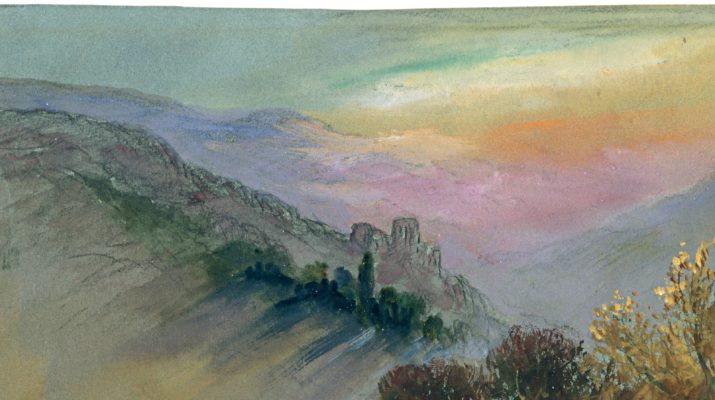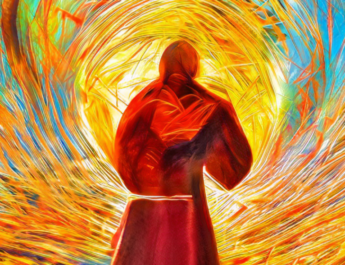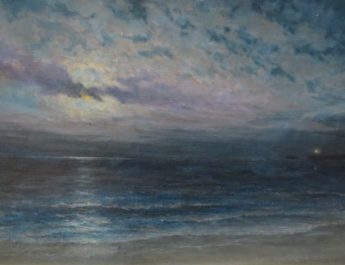Psalm 121
Second Sunday in Lent A
1 I lift upC my eyesD to the hillsE—
A “song” = shir. From shir (to sing; one who is singing or leading others in song). This is song or singer.
B “ascents” = ma’alah. From ma’aleh (ascent, platform, slope, stairs, cliff, elevation, a rise; figuratively, a priority); from alah (to go up, ascend, be high, be a priority; to arise in a literal or figurative sense). This is something that arises, elevation, a journey to a higher pane. This can be used figuratively to mean having a though or being of a superior status. It is often used in a specific sense for something the mounts to a climax. This is step, stair, or high degree.
C “lift up” = nasa. This is to lift in a broad sense, literally and figuratively. So it could be to carry, take, or arise. It could also be bring forth, advance, accept.
D “eyes” = ayin. This is eye in a literal or figurative sense so eye, appearance, favor, or a fountain (the eye of the landscape).
E “hills” = har. From harar (hill or mountain). This is mountain, hill, hilly region.
from where will my helpF come?G
2 My help comes from the Lord,H
who madeI heavenJ and earth.K
F “help” = ezer. From azar (to help, protect, support, ally; properly, to surround so as to provide aid). This is help, aid, or helper. This word is used in Genesis 2:18 when God decides to make for Adam, “a helper as his partner.” If the same word can be used of God’s help (as in Psalm 121:1), then we should not downplay the significance of this formulation of “help.”
G “come” = bo. This is to enter, come in, advance, fulfill, bring offerings, enter to worship, attack. It can also have a sexual connotation.
H “Lord” = YHVH. From havah (to be, become) or hayah (to come to pass, become, be). This is the name of the God of Israel, the self-existent and eternal one, the tetragrammaton. This pronunciation has been lost to time so “Lord” is generally used in its place.
I “made” = asah. This is to make, do, act, appoint, become in many senses.
J “heaven” = shamayim. Root may mean being lofty. This is sky, the air, or heaven. It is in a dual noun form so this might refer to the part of the sky where the clouds move on the one hand and the part beyond that where the sun, moon, and stars are on the other hand.
K “earth” = erets. Root may mean to be firm. This is earth, ground, field land, or country.
3 He will not letL your footM be moved;N
he who keepsO you will not slumber.P
L “let” = natan. This is to give, put, set, offer. It is to give literally or figuratively.
M “foot” = regel. This is foot, endurance, or journey. It is a foot as the means of walking and so it implies a step or a greater journey. It can be used euphemistically for private parts.
N “be moved” = mot. 6x in OT. From mot (to shake, slip, falter, stagger, move, fall, give way, waver, be carried). This is a pole, a bar for carrying, a yoke.
O “keeps” = shamar. This is to keep, watch, or preserve. It means to guard something or to protect it as a thorny hedge protects something.
P “slumber” = num. 6x in OT. This is to sleep because drowsy.
4 QHe who keeps IsraelR
will neither slumber nor sleep.S
Q {untranslated} = hinneh. From hen (lo! Behold! If, though; an expression of surprise). This is to draw attention, show suddenness or surprise, or to emphasize the importance of the coming statement. See! Lo! Behold!
R “Israel” = Yisrael. From sarah (to persist, exert oneself, contend, persevere, wrestle, prevail) + el (God or god). This is Israel, meaning God strives or one who strives with God; new name for Jacob and for his offspring. This refers to the people and to the land
S “sleep” = yashen. This is to be languid or go slack. By implication it can mean to sleep, become old or stale, or die.
5 The Lord is your keeper;
the Lord is your shadeT at your rightU hand.V
T “shade” = tsel. From tsalal (to be or become dark, shade; this is the shade as during twilight or shadow as associated with something opaque). This is shade in a literal or figurative sense. So, it could be shadow, shade, protection, shelter, or defense.
U “right” = yamin. May be from yamam (to go or choose the right, use the right hand; to be physically fit or firm). This can mean right hand, right side, or south. Since most people are right-handed, the metaphorical usage of this word presumes that the right hand is stronger and more agile. Thus, it is the instrument of power and action.
V “hand” = yad. This is hand, ability, power. Hand in a literal sense, but also what one can do or the means by which one does it.
6 The sunW shall not strikeX you by dayY
nor the moonZ by night.AA
W “sun” = shemesh. This is sun or toward the east. Its root may mean being brilliant. Figuratively, this could be a ray or an arch.
X “strike” = nakah. This is to hit whether lightly or severely. It can be used in a literal or figurative sense. So, this could be beat, punish, give wounds, kill, or slaughter.
Y “by day” = yomam. From yom (day, age, daily, each, today). Root may mean to be hot. So, this is day as the hours that are hot. This can be daytime in a literal or figurative sense.
Z “moon” = yareach. Perhaps from the same as yerach (month). This is moon.
AA “night” = layil. Properly, this refers to light twisting away. It is used for night or midnight. Figuratively, this can mean adversity.
7 The Lord will keep you from allBB evil;CC
he will keep your life.DD
8 The Lord will keep
your going outEE and your coming in
from this time on and forevermore.FF
BB “all” = kol. From kalal (to complete). This is all or every.
CC “evil” = ra’. From ra’a’ (to be evil, bad, afflict; properly, to spoil – to destroy by breaking into pieces; figuratively, to cause something to be worthless; this is bad in a physical, social, or moral sense; that which displeases, to do harm or mischief, to punish or vex). This is bad, disagreeable, that which causes pain, misery, something having little or no value, something that is ethically bad, wicked, injury, calamity. This refers to anything that is not what it ought to be – a natural disaster, a disfigurement, an injury, a sin.
DD “life” = nephesh. Related to naphash (to refresh or be refreshed). This is soul, self, person, emotion. It is a breathing creature. Can also refer to appetites and desires.
EE “going out” = yatsa. This is to go or come out, bring forth, appear. It is to go out in a literal or figurative sense.
FF “forevermore” = olam. This is a long scope of time whether in the past (antiquity, ancient time) or in the future (eternal, everlasting).
Image Credit: “Mountain Landscape” by Hercules Brabazon.




